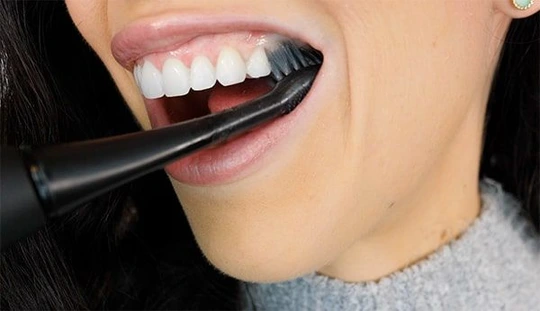Are Electric Toothbrushes Better?


Are electric toothbrushes better than your standard manual version? If you have the right one and use it correctly — then yes! But even a “bad” electric toothbrush or improper use will make electric toothbrushes less effective than a traditional one. When it comes to the manual vs. electric toothbrushes debate, a high-quality powered version is — hands down — the best choice for your smile. But much of its efficacy will depend on the type of model that you choose.
Manual Vs. Electric Toothbrushes
Let’s look at the big picture first. Electric toothbrushes are capable of making thousands of tiny strokes in just a few seconds, whereas manual toothbrushes are not. If someone needs help in the oral hygiene department, dentists and hygienists will likely recommend electric toothbrushes. You’re just getting more physical cleaning action because of the number of strokes involved with an electric version.
With over 14,000 people participating in a poll on my YouTube channel, 63% said they are using a manual toothbrush over an electric toothbrush. The BURST Sonic electric toothbrush is a great upgrade that won’t break the bank!

It’s all dependent upon your technique, how often you use it, and the quality/make/design of the toothbrush as a whole.
Electric Toothbrushes Pros
- The hundreds and thousands of brushstrokes that you get from electric toothbrushes give you more cleaning power during every brushing session.
- The added stimulation to your gum tissues promotes better blood flow to encourage healthier gingiva.
- Limited movement is required. Simply hold the brush where you want it to clean, and it does the work for you!
- Larger handle designs and powered bristle motions work well for people with limited dexterity.
- Models with built-in timers ensure that you know how long you’re brushing each area of your mouth so that you clean your teeth for the full two minutes.
- Powered bristle motions tend to be better for stain prevention and removal.
- Preferred for patients wearing fixed orthodontic appliances (like braces) who need to target plaque across more surface areas.
Related: 7 Best Electric Toothbrushes
Electric Toothbrush Cons
Are electric toothbrushes better in every scenario? Nope. There are still some disadvantages and design issues that you’ll need to watch for when you’re looking to buy one. Some of the most noticeable downsides to electric toothbrushes include:
- Designs with rough, stiff, or poorly-made bristles.
- Power source and battery life (i.e. how often will it need to be charged? Are batteries required?)
- Initial costs are much higher than a manual toothbrush.
- Ongoing costs associated with brush head replacements.
- Sometimes difficult to travel with due to size, charging, etc.
- Not suitable for all dental patients.
- May be too rough or irritating for people with sensitive teeth and gums.
Manual Toothbrush Pros
Before electric toothbrushes were ever invented, people were able to effectively clean their teeth with manual toothbrushes. As the years have gone by, improvements in manual brush and bristle designs have made them gentler and more effective than the pre-modern versions that were made from hog hair (yes, as in pigs, yes, seriously!)
Some of the biggest perks of manual vs. electric toothbrushes is that manual versions:
- Are more affordable. Practically anyone can buy one at any time.
- Cheap to replace every 3-4 months.
- Comfortable for people with sensitive teeth, as you can apply the amount of pressure that you prefer.
Manual Toothbrush Cons
Cheaply made, budget, or dollar store toothbrushes may not have rounded bristle tips. The cut or jagged surfaces at the end of each bristle could cause permanent tooth and gum damage.
Manual toothbrushes also come in a variety of textures, including hard, stiff, extra-hard, and extra-stiff bristles, all of which are too rough for you to use properly.
You might be asking, “Why do they come in hard or extra-stiff textures if those are bad for your teeth and gums?” Because people buy them. Just like people buy other things that aren’t “healthy” or “good” for them. As long as people purchase those types of toothbrushes, manufacturers will continue to make them. But they are good for one thing — cleaning your grout or bathroom sink!
Do Electric Toothbrushes Damage Teeth?
Any toothbrush can damage your teeth if it’s used incorrectly. Applying excessive pressure such as aggressive back-and-forth scrubbing can eventually wear away your tooth enamel. The same can be said for overzealous brushing with a manual toothbrush. However, it’s usually less common to see enamel abrasion with a powered version.

Let’s not forget about your gums, either. If excessive force and “scrub brushing” with a manual or electric toothbrush can erode enamel, it can also lead to gum recession. Your gums are delicate. Pressing against them with stiff bristles or harsh brushing twice a day will cause them to pull away and recede down the length of your tooth root.
In my experience of working with patients, it’s much more common to see people with manual toothbrushes damage their teeth and gums than it is people with a high-quality electric version. I think most dentists and hygienists would agree with me.
What Are The Benefits Of An Electric Toothbrush?
To get the most out of an electric toothbrush, you’ll want to invest in a quality model that’s at least a mid-range design. This step will ensure that you’re selecting one gentle yet effective. Work with your dentist or dental hygienist to make sure you’re picking the right model. You can always upgrade later if you want to.
When Should You Replace The Toothbrush Head?
One of the reasons why you have to replace manual toothbrushes every 3-4 months is because the bristles start to wear out, warp, or become too jagged. The same is the case for electric toothbrushes.
Some electric toothbrush heads have wear indicators that signal when it’s time to change them out. Usually, that’s every 3-4 months, just like a manual brush. But like manual brushes, you’ll also want to throw away or disinfect your toothbrush if you get sick. Some electric brushes have built-in sanitizers or direct you to run the brush head through the dishwasher so that you don’t have to dispose of it prematurely.
Depending on the model of toothbrush you’re using, you might be able to subscribe to an auto-refill option where a replacement head is mailed to you without having to think about it. Then you just change it out every time one arrives. Otherwise, you can buy them at your local retail store, pharmacy, or get bulk packages online.
Spin vs. Sonic Electric Toothbrush Heads
Should Kids Use Electric Toothbrushes?
Electric toothbrushes can be extremely helpful for children who a) don’t like to brush their teeth, b) still lack the dexterity they need to brush efficiently, or c) have fixed orthodontic appliances. Some brushes even have fun designs or play songs, making brushing more enjoyable for kids that might not otherwise want to brush their teeth. If it has a built-in timer, children will be more apt to brush for the appropriate length of time.
BURST also made an electric toothbrush just for kids to step up their oral health. In almost every case, kids that use electric toothbrushes properly tend to have much healthier teeth and gums than when they brush with a manual toothbrush. It really boils down to the number of brush strokes they’re getting with the toothbrush and the overall contact time their brush has on their teeth. If they’re swiping back and forth with a manual design, they’re only removing a fraction of the plaque that an electric brush can clean off.
Look for a quality brush that’s both soft-bristled and on the more durable side of things — just in case it gets dropped somewhere.
So Which Is Better?
When you’re comparing manual vs. electric toothbrushes, powered versions are almost always better (assuming they’re not cheaply made.) Investing in a great electric toothbrush can help you enjoy fresher breath, brighter teeth, and almost more importantly, healthier gums! Talk to your dentist or hygienist for additional guidance on choosing the best design.

Make your inbox smile!
Subscribe






